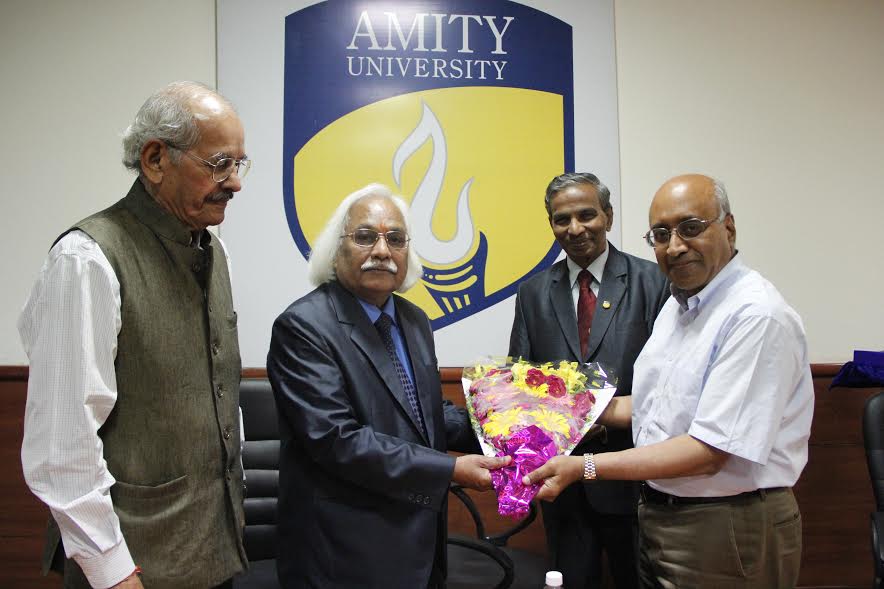Amity University Haryana organized a guest lecture on Aerosol Effects on Air Quality
Manesar : Amity University Haryana at its Manesar campus organized a guest lecture on Aerosol Effects on Air Quality and Global-to-Regional Climate Change was delivered by Prof. V. “Ram” Ramaswamy, a world-renowned climate scientist and Director, Geophysical Fluid Dynamics Laboratory (GFDL)/NOAA, Princeton, New Jersey, USA.
Good Air Quality is essential for our health, quality of life and the environment. Air becomes polluted when it contains substances which can have a harmful effect on the health of people, animals and vegetation. The main causes of air pollution include transport, domestic combustion and industrial processes
Aerosols arising as a result of natural and human-induced emissions have been a key ‘driver’ of atmospheric composition, air quality, and in the forcing of climate. The manner of the resulting climate change is sensitive to the types of aerosols (sulfates, black & organic carbon, nitrates, dust), their scattering and absorption properties, and to the interactions between aerosols and clouds. Using the NOAA/GFDL global climate models and observations from multiple platforms, we investigate the radiative perturbations due to the 20th Century sulfate and carbonaceous aerosol emissions, and the resultant impacts on surface temperature, tropical precipitation, Indian monsoon, hemispheric circulation, and atmospheric and oceanic heat transports. The influence of the aerosol species has many contrasts with that due to the emissions of well-mixed greenhouse gases e.g., the asymmetry in the hemispheric climate response, but is subject to larger uncertainties. The aerosol forcing expected in the future indicates a significant control on the 21st Century air quality and anthropogenic climate change.
Aerosol emissions in the latter half of the 20th Century in Asia has presented an unusual confluence of several features involving regional atmospheric composition, air quality, radiative forcing, and climate dynamics. Both the atmospheric content and radiative effects depend on the amount of sulfates and carbonaceous particulates. On the temperature front, the predicted warming of the tropics due to increases in the well-mixed greenhouse gases has been reduced in magnitude owing to the presence of aerosols. On the precipitation front, aerosols have exerted effects that are still uncertain to some extent but their influence has likely rivaled that from expectations solely due to the greenhouse gas increases. The uncertainties arising from the multi-faceted characteristics of aerosols require critical attention, and urgent scientific resolution, in order to accurately explain the course of climate change over the 20th Century and provide confident air quality and climate predictions for the 21st Century.
While addressing the students Prof (Dr.) P B Sharma, Vice Chancellor, Amity University said “ We should make our environment healthy, a healthy environment lead to healthy nation. And we also encourage our society to work on Solar Energy and E – Vehicles. We should do more and more R & D to work on these methods.”
“Here at Amity University Gurgaon, we are seriously engaged into finding the scientific solutions to improving air quality. Our judgment is that time has come when India, must switch over to hybrid vehicles as well as hydrogen cars. India can do it and should do it, after-all it is sitting on the goldmine of opportunity of showing the world that the monster of air pollution can be tackled, Prof Sharma added.
While addressing the students Prof. V. “Ram” Ramaswamy said “Air Quality and Climate Change is not a new problem to us. Many scientists are researching and working on this problem. But I want to tell you that apart from PM 2.5 and PM 10 we should also focus on Aerosol as it plays an important part in air quality and climate change.”
Prof (Dr.) P B Sharma, Vice Chancellor, Amity University, Maj Gen B S Suhag(Retd), Deputy Vice Chancellor, Amity University Gurgaon, Prof (Dr.) Padmakali Banerjee, Pro Vice Chancellor, Amity University Gurgaon, Maj Gen G S Bal(Retd.), Dr PCS Devara faculty staff and students were also present to attend the event.

